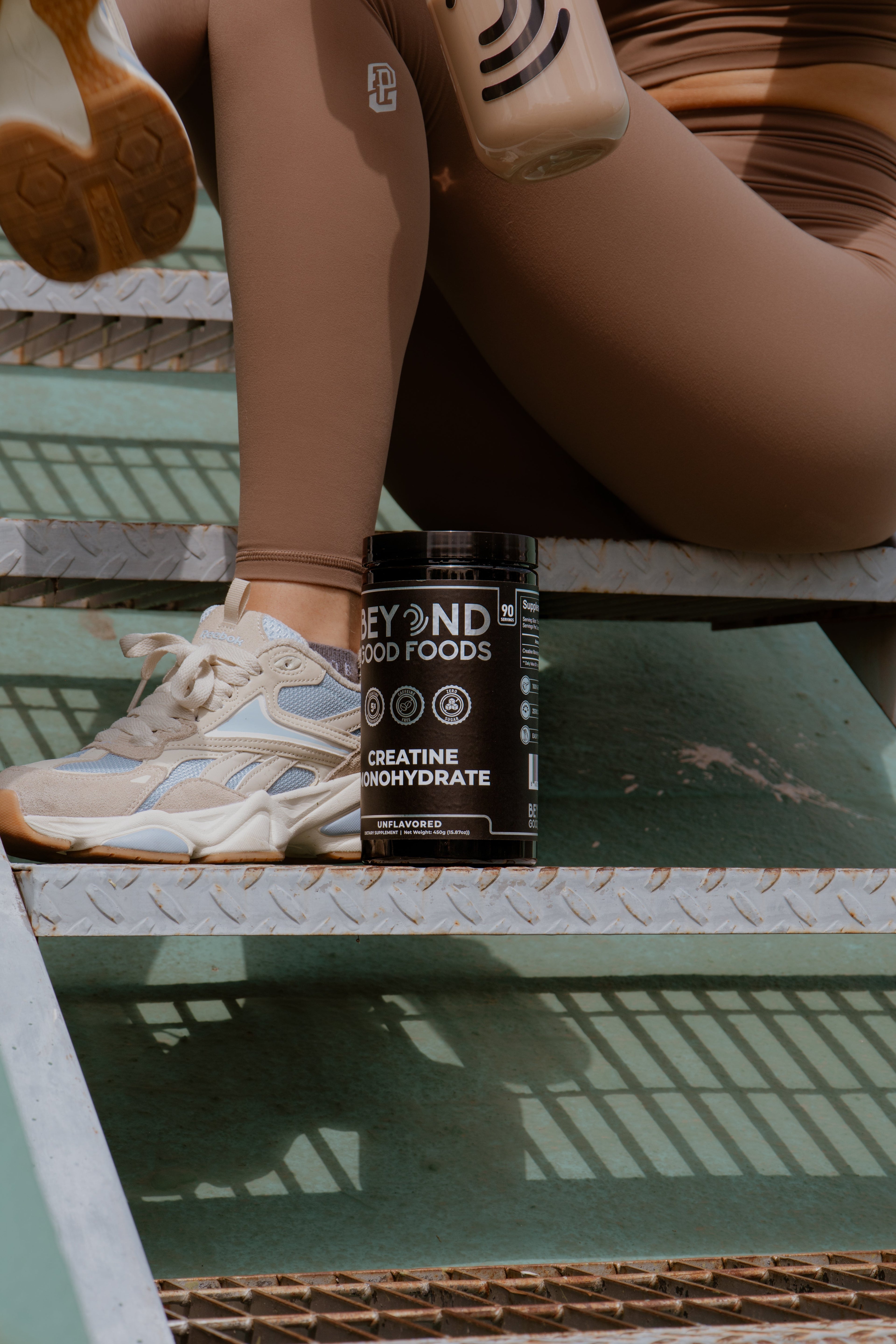For any athlete, every explosive movement, from a heavy lift to a powerful sprint, begins with a biological spark. That spark is Adenosine Triphosphate, or ATP, the body's direct source of energy for muscle contractions. The challenge is that our natural supply of ATP is incredibly limited, lasting only for a few seconds of maximum effort. Once it's gone, power output drops significantly. This is where creatine enters the picture, not as a foreign substance, but as a key player in our natural energy cycle.
Creatine’s primary job is to act as a rapid recharger for our energy system. It works by donating a phosphate group to regenerate spent ATP, effectively extending our capacity for high-intensity work. Think of it like a backup power source that kicks in instantly, allowing your muscles to keep firing at full force for longer. While the body can produce some creatine on its own from amino acids, the amount is often not enough to fully saturate muscle stores, especially for those engaged in demanding training. To understand more about what this means for your workouts, it's helpful to look at the documented creatine benefits and its role in performance.
Performance Benefits for Strength and Endurance
With a clear understanding of how creatine fuels muscle energy, we can explore its tangible impact on training performance. The benefits are not just theoretical; they translate directly into what you can achieve in the gym and during competition. For plant-based athletes, these advantages are particularly significant, helping to support consistent progress and recovery.
Enhanced Strength and Power Output
When your muscles are fully saturated with creatine, you have more immediate energy available for intense efforts. This means you can push out that extra repetition or add a little more weight to the bar. We all know that feeling of hitting a wall mid-set. Creatine helps push that wall back. This increased work capacity is a fundamental driver of progressive overload, which is essential for stimulating muscle growth on a vegan diet.
Improved Muscular Endurance and Recovery
Faster ATP regeneration doesn't just mean more power; it also means better endurance during a workout. You might notice you need slightly less rest time between sets or that your performance doesn't drop off as sharply toward the end of your session. This allows for a higher overall training volume, a key factor for long-term athletic development. This increased capacity for work is a cornerstone of progress, a topic we explore further in our other articles.
Cognitive Support Under Physical Stress
The benefits of creatine are not limited to the muscles. Intense physical exertion is also mentally taxing. As highlighted in research from journals like Nutrients, creatine supplementation can support cognitive function and reduce mental fatigue during demanding workouts. This mental clarity can be the difference between a focused, effective session and one that feels scattered. The primary vegan creatine supplement benefits include:
- Increased strength and power for more effective workouts.
- Greater muscular endurance to handle higher training volumes.
- Faster recovery between sets and sessions.
- Enhanced cognitive function under physical stress.
The Creatine Gap in Plant-Based Diets

Here is a straightforward truth: significant amounts of dietary creatine are found almost exclusively in animal tissues like red meat and fish. This fact immediately highlights a challenge for anyone following a plant-based diet. Without these direct sources, the body must rely entirely on its own internal production from amino acid precursors like arginine, glycine, and methionine.
A common question is whether certain plant based creatine sources can fill this need. While nuts, seeds, and legumes provide the necessary amino acid building blocks, the body's conversion process is limited and inefficient. It simply cannot produce enough creatine to raise muscle stores to the optimal levels needed for high-performance training. This isn't a failure of a vegan diet; it's a physiological reality. Research consistently confirms this, with studies in publications like the European Journal of Sport Science showing that vegetarians and vegans have significantly lower muscle creatine concentrations compared to their omnivorous counterparts, as detailed in research available through PubMed. This difference is often referred to as the "creatine gap." The good news is that this gap is easily and effectively closed with supplementation, allowing plant-based athletes to perform on a completely level playing field.
| Source | Typical Creatine Content (per kg) | Practicality for Vegans |
|---|---|---|
| Red Meat (Beef) | ~5g | Not applicable (animal product) |
| Fish (Herring, Salmon) | ~6-10g | Not applicable (animal product) |
| Poultry (Chicken) | ~4-5g | Not applicable (animal product) |
| Plant-Based Precursors (Nuts, Seeds, Legumes) | 0g (contains amino acids for synthesis) | Inefficient; cannot achieve optimal muscle saturation |
| Synthetic Creatine Monohydrate | 1000g | Ideal; clean, effective, and fully vegan |
Choosing and Using Vegan Creatine Supplements
Once you understand the need for supplementation, the next step is practical application. Fortunately, incorporating creatine into your routine is simple and straightforward. The most widely studied and effective form, creatine monohydrate, is synthetically produced from non-animal sources, making it inherently vegan-friendly. When choosing a product, look for a clean formula without unnecessary fillers and consider brands that use third-party testing for purity and quality.
When it comes to how to take creatine, there are two common and effective strategies. Your choice depends on how quickly you want to see results:
- The Loading Phase: This approach is designed for rapid muscle saturation. You take a higher dose of about 20 grams per day, split into four 5-gram servings, for 5 to 7 days. After the loading phase, you switch to a daily maintenance dose of 3 to 5 grams.
- The Maintenance-Only Approach: This method is simpler and may be gentler for those with sensitive stomachs. You simply start with the daily maintenance dose of 3 to 5 grams from day one. Your muscles will reach full saturation in about three to four weeks.
Both methods are equally effective in the long run. The best strategy is the one you can stick with consistently. Creatine powder is virtually tasteless and dissolves easily, making it a seamless addition to your daily habits. It integrates perfectly into a post-workout shake, and you can find some delicious ideas in our guide to easy vegan protein recipes. When you're ready to incorporate a high-quality supplement for creatine for vegan athletes into your regimen, you can explore clean options in our collection.
A Strategic Part of Plant-Based Fitness

For vegan athletes, creatine is not just another supplement. It is a scientifically validated, ethical, and highly effective tool for optimizing performance. It bridges a physiological gap, ensuring that your hard work in the gym translates into the results you deserve. Remember, creatine is an amplifier of your effort, not a replacement for it. Its benefits are fully realized when combined with consistent training, sound nutrition, and adequate rest.
Making the choice to supplement is an informed, proactive step toward reaching your full athletic potential without compromising your values. By making informed choices, you empower your entire fitness journey. To learn more about optimizing your plant-based nutrition, visit us at Beyond Good Foods.




